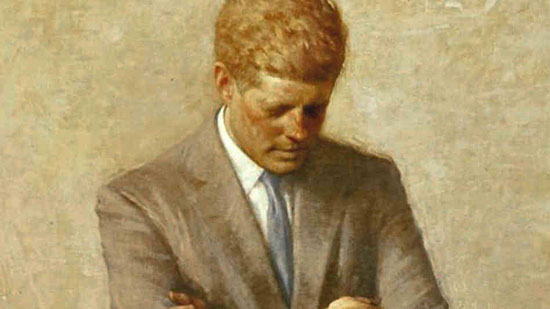Remembering JFK
November 22, 2013

John F. Kennedy's official presidential portrait by artist Aaron Shikler was posthumously unveiled in 1970.
It was the fall of 1960, just two months before the presidential election, and John Kennedy was making a swing through Los Angeles for a rally at the Shrine Auditorium. I was 11, and I was determined to be there.
Kennedy already was my hero. When he challenged us with his youthful energy to give more of ourselves in the service of others, he sparked a political flame in me. So I begged my dad to take me to the Shrine. Before we jumped into our Plymouth for the drive downtown from our Fairfax home, I grabbed a stick in the backyard and taped a Kennedy bumper sticker to it.
When we arrived at the Shrine, the place was mobbed. We couldn’t get inside but, because I was small, we snaked and jostled our way through the thick forest of excited grown-ups to the very front of a walkway where Kennedy would pass to enter the auditorium. As my striding hero approached, I shouted and waved that stick so wildly that he had to step back to keep from getting whacked.
Inside the auditorium, the candidate would speak on the weighty matters of the day—the tightening tensions between democracy and communism, survival in a difficult and dangerous world, racial and religious bigotry. As I sit here now, I suspect most of those policy points would have gone over my head. But the promise of a New Frontier that Kennedy carried into L.A. and across the nation certainly didn’t miss the mark with my heart.
In recent days, we’ve seen stories of every sort and slant on Kennedy and his administration to commemorate the 50th anniversary of his assassination in Dallas on November 22, 1963. Scholarly debates over the impact of his presidency will persist for decades to come. So too, I imagine, will the lingering conspiracy theories that swirl around the rifle shots fired by Lee Harvey Oswald.
But in my circle of friends, we’ve found ourselves talking less about the details and what-ifs of JFK’s presidency and more about his personal impact on the course of our lives during such formative ages. Truth is, many of us have never gotten over Kennedy’s death. It was so sudden, so personal. In that sense, it reminded me of the grief of my mom’s passing just four years earlier.
During Kennedy’s tenure, we were still too young to be skeptical or, worse, cynical from the experience of some earlier political disappointment. When John Kennedy said anything was possible, we believed. When he told us we could make a difference, we acted—even if it was in our own, youthful ways.
I can still remember running for Boy’s League vice president in 9th grade at Bancroft Jr. High School in Hollywood after Kennedy’s election—my first political race. During a campaign “speech” to the students, I informed them that a special guest was there to offer support for my candidacy. I turned around and pulled on a Kennedy mask that I’d been hiding behind my back. I then swung around again and, in what I’d like to think was a pretty spot-on Kennedy impersonation, urged the now-cheering students to cast a ballot for Zev. I won, with 90 percent of the vote.
Today, I look back at my silly play-acting and know, on a deeper level, that I was identifying for the first time with a real-life political figure, an identification that has inspired me throughout my nearly 40 years in elective office. The political activism to which I’ve dedicated my life began with Kennedy.
During the past few days, amid all the news coverage, I’ve been asked the difficult question of how I think the Kennedy assassination is relevant to today’s younger generation. Why should they care?
Many historians have asserted that the political and cultural upheaval of the 1960s—which informs much of who we are today—began on that sad day in Dallas. The president’s killing set the stage for the assassinations of Martin Luther King, Jr., Bobby Kennedy and too many others, seemingly raising the nation’s tolerance for political violence.
But the reality is that for those of us of a certain age, our most visceral connection to the assassination is with the seared memories of where we were and how we felt when we heard the news. (I was in Spanish class, where my teacher dissolved into tears.) The gut-wrenching depth of that individual grief, multiplied by millions across a nation, can never truly be expressed to anyone who wasn’t there.
Maybe the most we can do to convey that trauma to the Millennial Generation is to note the impact the 9/11 attacks had on their lives. Ask any of them, and they can vividly tell you where they were when the towers of the World Trade Center came crashing down.
But, on a more positive note, I might also offer them a few words from the speech that candidate Kennedy delivered inside the Shrine Auditorium, as my dad and I worked our way back to the car—a reminder of the timeless relevance of his vision and of our responsibilities.
“If we measure up not only in the public sense,” Kennedy said, “but in the private sense to the opportunities that we have, if we recognize that…liberty calls for certain qualities of self-restraint and character which go with self-government, I am confident that the future can belong to those who believe in freedom.”
Posted 11/22/2013












 405 bridge work causes a stink
405 bridge work causes a stink





